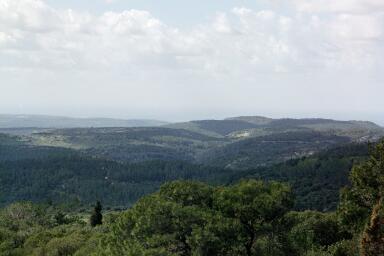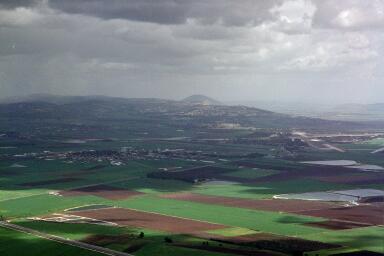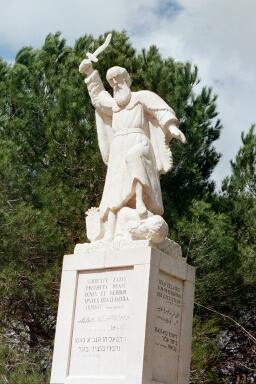Carmel - and Standing for the Truth
Reading: 1 Kings 18.36-39
 On our way from Tel Aviv in the south to Tiberias on the Sea of Galilee, our bus driver took us to the highest part of the Carmel range.
On our way from Tel Aviv in the south to Tiberias on the Sea of Galilee, our bus driver took us to the highest part of the Carmel range.
That was possibly the first correction of our presumed knowledge of Biblical geography. For years I have been able to draw a reasonable map of Israel on a blackboard. I knew that Mount Carmel was just inland from where the coastline jutted out into the Mediterranean. In fact, Carmel is a whole range which separates the coastal plain from the Valley of Jezreel.
The Valley of Jezreel is a very fertile valley with the river Kishon flowing north-northwest into the Mediterranean Sea. We could look across it to Nazareth in the distance and Mount Tabor on the horizon.
 I had never associated the Carmelite order with Mount Carmel. But there, on the summit, is a Carmelite monastery – and excellent vantage-point from which to view the surrounding countryside. The order was founded in the twelfth century.
Biblically, we associate Carmel with the story of Elijah’s very public confrontation with the prophets of Baal (1 Kings 18.16-46). In front of the monastery is a large statue of the prophet, sword in hand, ready to despatch one of these prophets.
I had never associated the Carmelite order with Mount Carmel. But there, on the summit, is a Carmelite monastery – and excellent vantage-point from which to view the surrounding countryside. The order was founded in the twelfth century.
Biblically, we associate Carmel with the story of Elijah’s very public confrontation with the prophets of Baal (1 Kings 18.16-46). In front of the monastery is a large statue of the prophet, sword in hand, ready to despatch one of these prophets.
I hadn’t expected the monastery, wasn’t surprised at the statue, but was somewhat taken aback at seeing the two within the same grounds. We tend not to associate a rigorous stand for the truth with the contemplative life. Perhaps with an awareness of religious wars elsewhere in the world and at other times – and with our laissez-faire multiculturalism here in Australia – we can find it difficult to justify – let alone identify with – the stand and actions of Elijah. Of all the Old Testament people to appear with Christ on the mount of transfiguration (traditionally believed to be Mount Tabor), we can understand Moses being there, but… Elijah (Matt. 17.3)?
Of all the Old Testament people to appear with Christ on the mount of transfiguration (traditionally believed to be Mount Tabor), we can understand Moses being there, but… Elijah (Matt. 17.3)?
Yet we notice also in Malachi, the last book of the Old Testament, that Elijah was expected to come before the Messiah arrived (Mal. 4.5-6) – an expectation that caused a lot of speculation about John the Baptist (John 1.21) – a rugged individual with a demeanour like Elijah’s and who called the people to repentance.
But back to Carmel. The worship of the Lord was under threat in the northern kingdom. King Ahab had married Jezebel, daughter of Ethbaal, the priest-king of Tyre and Sidon.
Jezebel was a fanatical devotee of Melqart, the Baal worshipped in Tyre. She was passionately promoting the worship of this Baal in Israel. Ahab built a temple for her and she had 450 prophets of Baal and another 400 prophets of the goddess Asherah. She was organising the systematic slaughter of the prophets and priests of the Lord.
Elijah the prophet of the Lord had emerged for the little-known village of Tishbe on the other side of the Jordan. He prophesied a major drought and promptly went into hiding. Three years later he revealed himself to the king and called for the prophets of Baal and Asherah and all the people to come to Carmel to settle the issue once and for all.
You have a choice before you, Elijah was telling them. "How long will you waver between two opinions? If the Lord is God, follow him; but if Baal is God, follow him" (1 Kings 18.21).
Two altars were set up. Sacrifices were to be prepared and laid on the wood, but no fire was to be set to it. The prophets of Baal prayed and danced and shouted all day, but no answer came. But when Elijah prayed, the Lord answered with fire.
The people were persuaded and Elijah took advantage of their enthusiasm to act against the false worship that was corrupting the worship of the Lord. Needless to say, Jezebel was not pleased…
Jesus said to the Jews who believed in him, "If you hold to my teaching, you are really my disciples. Then you will know the truth, and the truth will set you free" (John 8.31-32). But he didn’t promise that our stand for the truth would be warmly accepted. Rather, "Blessed are you when people insult you, persecute you and falsely say all kinds of evil against you because of me. Rejoice and be glad, because great is your reward in heaven, for in the same way they persecuted the prophets who were before you" (Matt. 5.11-12).
The truth sets us free when we hold to it – live by it – because we are then living in the manner life was meant to be lived.
There was a continuing problem in Elijah’s time, but not just because of Jezebel. The truth that "the Lord – he is God!" needed to be translated into life. In a sense, what happened on Carmel was the easy part.
Jesus said, "Not everyone who says to me, ‘Lord, Lord,’ will enter the kingdom of heaven, but only he who does the will of my Father who is in heaven" (Matt. 7.21). Standing for the truth and being convinced about the truth should lead to living by the truth. Our word for that is "integrity". Living under God’s grace and lordship is liberating.
| PRAYER: Lord, it is so easy for us to be like the Israelites in Elijah’s time – believing in you, yet caught up in modern ideals and idealogies that are far removed from faith in you. We want to live by your truth. We want to be set free by your truth. We bring this day to you – to live moment by moment under your grace and lordship. In Jesus’ name, Amen. |
A Life Complete
I want
a life
complete,
fulfilling,
fulfilled.
Surely
I will find it
in some latest thing
recently designed
strongly pressed
on me
by the media.
Surely
I will find it
in some latest idea
propounded
by a modern guru
expounded
in TV soapie
and glossy magazine.
Why do I keep on looking?
Why does the quest go on?
Why is nobody finally
satisfied?
Why do I assume
that the latest gadget or idea
can make me new?
Your way, Lord,
your way alone
can fulfil me!
Your truth, Lord,
your truth alone
can set me free!
Your life, Lord,
your life alone
can make me new!
© Peter J. Blackburn, Burdekin Blue Care Devotions, 11 September
2001
More photos of Israel are available here.
Except where otherwise noted, Scripture quotations
are from the New International Version, © International
Bible Society, 1984.
Back to Sermons
 I had never associated the Carmelite order with Mount Carmel. But there, on the summit, is a Carmelite monastery – and excellent vantage-point from which to view the surrounding countryside. The order was founded in the twelfth century.
Biblically, we associate Carmel with the story of Elijah’s very public confrontation with the prophets of Baal (1 Kings 18.16-46). In front of the monastery is a large statue of the prophet, sword in hand, ready to despatch one of these prophets.
I had never associated the Carmelite order with Mount Carmel. But there, on the summit, is a Carmelite monastery – and excellent vantage-point from which to view the surrounding countryside. The order was founded in the twelfth century.
Biblically, we associate Carmel with the story of Elijah’s very public confrontation with the prophets of Baal (1 Kings 18.16-46). In front of the monastery is a large statue of the prophet, sword in hand, ready to despatch one of these prophets. On our way from Tel Aviv in the south to Tiberias on the Sea of Galilee, our bus driver took us to the highest part of the Carmel range.
On our way from Tel Aviv in the south to Tiberias on the Sea of Galilee, our bus driver took us to the highest part of the Carmel range. Of all the Old Testament people to appear with Christ on the mount of transfiguration (traditionally believed to be Mount Tabor), we can understand Moses being there, but… Elijah (Matt. 17.3)?
Of all the Old Testament people to appear with Christ on the mount of transfiguration (traditionally believed to be Mount Tabor), we can understand Moses being there, but… Elijah (Matt. 17.3)?